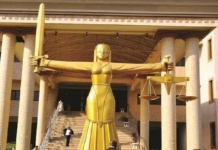
By Olakunle Agboola – Nigeria is Africa’s most populous country, largest economy, most notable democracy, and a bellwether for the continent. A stagnant economy, rising insecurity, and violent conflicts threaten progress made in its democratic development. Amid deepening distrust in government and institutions, Nigeria has significant work to do in enhancing good governance with a fresh political dispensation coming May 29, 2023.
The situation in Nigeria is becoming a huge concern especially the levels of ethical decadence of the political system, electorate, and established institutions to checkmate corrupt practices. It is becoming more apparent that Nigeria is drowning in a “have all, possess all” mentality that has become an endless orgy of spend and gain.
Position and power have become keys to accessing resources meant for the general good and converting those resources into a private fortune. The result is building enormous wealth abroad with public tax funds, while millions continue in the clenching of suffering. The baiting card of ethnicity and religious sentiment has continued to be a great weapon used by politicians to defend their heartless looting of public funds for personal interest.
The never-ending political subjugation, thuggery, and terrorization during the election will continue to hurt and bleed the Nigerian State if the political elite will not put the nation above their selfish interest. The scramble for power in Nigeria is not driven by a desire to serve but by waiting for turns to loot. And that is the reason the political seat has become a do-or-die affair which is not different from the theatrical performance of ‘Agbako’ in the ‘Arelu’ series of the 80s.
Nigeria over the years has always had the wrong set of political leaders in power which is deep-seated in the despotism character of the political parties. The obnoxious structure within the parties has made it difficult for reasonable leaders with ethical values to emerge. This is the major reason why corruption has become part of Nigeria’s institution and is now very difficult to wear down.
The fight against corruption has always been selective and most of the time is against the opposition party and those who fail to dance to the rhythms of the ruling party. And when the sword of war against corruption is directed towards the governing party, it is made very complicated by a multiplicity of terms and definitions—fraud, misappropriation, money laundering, illicit financial flows, and so on! These have left average citizens wondering and questioning their sense of judgment of why not call a thief a thief.
The failure of political governance has made corruption endemic in Nigeria and is a shared fundamental root cause. Most political leaders come to power through corrupt and weak institutions, such as electoral commissions and the judiciary. It is too much to expect a government that comes to power through a corrupt electoral system to then turn around and fight corruption. I have argued in different places that it will be difficult to plant the seed of corruption and expect the fruit of morality.
The media are not left out taking sides instead of being independent arbiters for the sanity of Nigerians. They have adopted the philosophy of “my friend’s corruption is okay, and I must look away while I fight his opponent’. And sometimes the media is bought by some of these politicians to defend and support their corrupt practices. It is worrisome to the five senses when some of these media houses defend lies and unknowingly destroy the moral sanity of a nation.
The first point of the call is to ensure the integrity of public procurement and a mental transformation in the whole accountability supply chain. This can only work through the education of many Nigerians who have believed that corruption is a way of life. The private sector must accept that bribery is wrong and that demanding bribes is wrong. Authorities must accept that using their position other than for the purpose for which it was intended is wrong. Surely, procurement professionals, accountants, bankers, lawyers, and people from all walks of life must know that taking part in corrupt activities is wrong and abetting corruption is wrong.
Society must be sensitized to abhor the corrupt and not celebrate them as many Nigerians have closed their eyes to the process of the recent election due to ethnic chauvinism. Nigerians can’t continue to defend falsehood and expect the nation to grow tall. The international community must openly reject all governments that fail to run elections in a free and fair manner and not allow diplomatic etiquette and trade interests to blind them as is apparent in the recent concluding elections in Nigeria.
We need to simplify the message about corruption so that every citizen regardless of their level of education can understand it and its negative impact on their own lives. Accountancy promotes the development of robust public sector governance by establishing a benchmark for good governance. Also, it promotes high-quality financial accounting and reporting by governments to improve transparency and help strengthen public sector financial management and culpability.
To promote integrity and defeat corruption, all of society needs to work together. Citizens of Nigeria must hold those charged with the responsibility of managing resources, whether in the public or private sector, to account for the use of these resources. Internationally, no country should allow itself to be a haven for corrupt proceeds from Nigeria and the rest of Africa. Corruption must be elevated to the level of criminality that it is—a crime against humanity.








